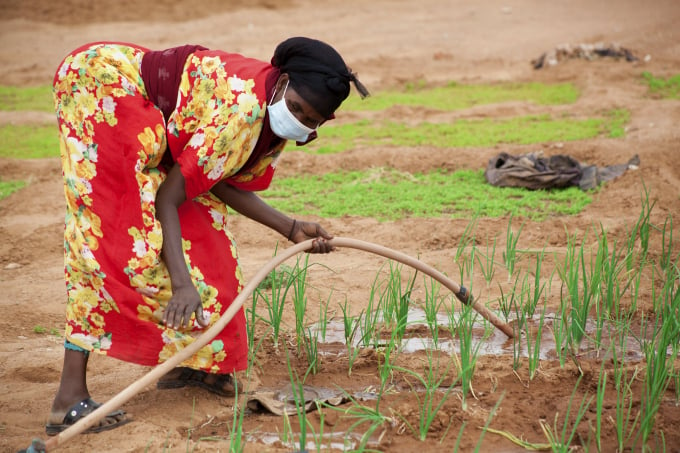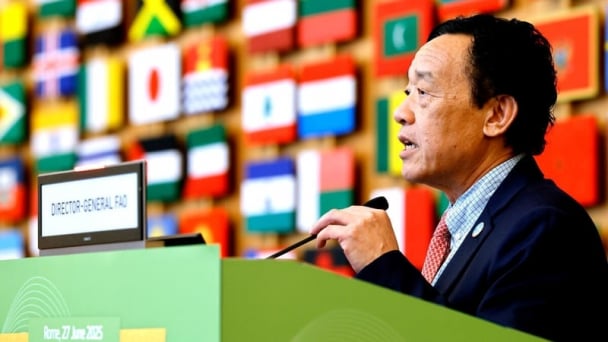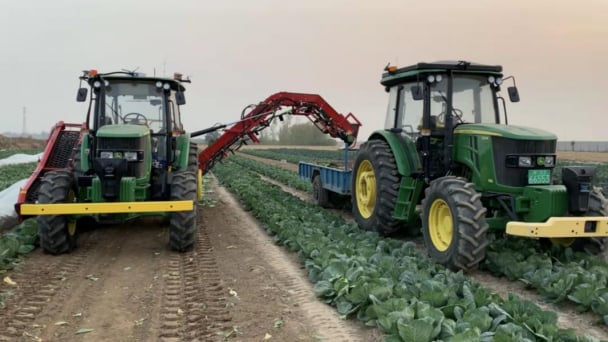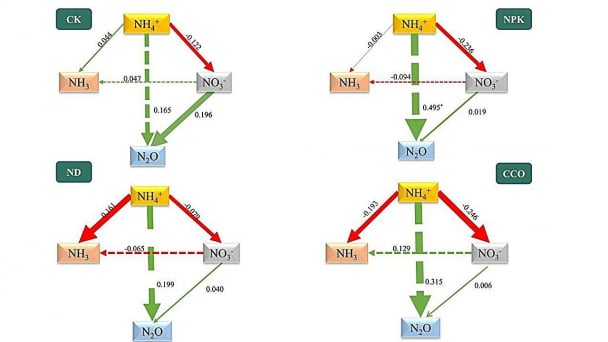July 1, 2025 | 16:31 GMT +7
July 1, 2025 | 16:31 GMT +7
Hotline: 0913.378.918
July 1, 2025 | 16:31 GMT +7
Hotline: 0913.378.918

Water scarcity often affects the most vulnerable, such as family farmers who see their harvests severely damaged by drought. Photo: Isak Amin/WFP
The world needs a more inclusive, integrated and innovative way of addressing the issue of water scarcity, which already threatens as many as 3.2 billion people living in vulnerable rural communities, the Director-General of the Food and Agriculture Organization of the United Nations (FAO), QU Dongyu, said today.
"We need solutions that tackle both the socio-economic and environmental dimensions of the interlinked problems of poverty, food, water and climate," Qu said in a video message to a high-level roundtable at the 9th World Water Forum in Dakar, Senegal.
The World Water Forum is the world's largest event on water, organized every three years by the World Water Council with a host country. This year's edition was the first to be hosted in Sub-Saharan Africa.
Other notable speakers addressing the event on water for rural development included Adamou Mahaman, Niger's Minister of Hydraulics and Sanitation, and Abdoulaye Sene, Executive Secretary of the 9th World Water Forum.
According to FAO's latest report - The State of Land and Water Resources for Food and Agriculture - water scarcity and pollution are stretching key agrifood systems around the world to breaking point. In much of Africa, water availability is so low that many countries don't have enough of it to grow food or to meet the demand from other sectors of the economy.
In all, 2.3 billion people already live in water-stressed countries, with over 733 million of them - or about 10 percent of the global population - living in countries with high and critical water stress. An even bigger number of people living in agricultural areas - 3.2 billion - are threatened by the risks that water scarcity poses for global food security and sustainable development. These are often the most vulnerable: smallholders and family farmers who see their harvests severely damaged by drought; the pastoralists who see their cattle and other livestock die of thirst; or the fisherfolk who see their fishing grounds shrinking and degraded.
"We need to recognize land and water rights for smallholder farmers, the poor, women, youth and Indigenous Peoples, and increase transparency and participation in resource management," Qu said.
Agriculture's role
Agriculture accounts for more than 70 percent of all freshwater withdrawals in the world, which is why there's a need to focus on a "More Food per Drop" approach based on new forms of water management, Qu said in his video message to the forum.
While the tremendous progress witnessed in food production in the last half century has made it possible to feed a rapidly growing population - thanks to irrigated agriculture that produces about 40 percent of the world’s food on only 20 percent of global cropland - there is still scope for improvement.
The climate crisis is also adding to the pressures on the availability of water, which is why "we need to protect and restore our ecosystems through green and climate-resilient agricultural practices that enable the sustainable production of agrifood products, while minimizing impacts on biodiversity and reducing greenhouse gas emission," Qu said.
"To move forward, at the scale and speed required, we need significant investment at all levels: political, financial and technological, and by societies," Qu said.
FAO is already supporting countries to attract and access climate finance and to implement climate-resilient innovation across agrifood systems, including through the Global Environment Facility and the Green Climate Fund.
The organization's Strategic Framework for the next decade also supports the 2030 Agenda for Sustainable Development through the transformation to more efficient, inclusive, resilient, and sustainable agrifood systems for better production, better nutrition, a better environment, and a better life for all, leaving no one behind.
(FAO.org)

(VAN) Director-General QU Dongyu addresses the 6th AU-EU Agriculture Ministerial Conference.

(VAN) In the suburbs of Beijing, there is an agricultural center spanning over 150 hectares dedicated to research, demonstration, and application of high-tech and precision agriculture.

(VAN) Researchers from the Institute of Applied Ecology of the Chinese Academy of Sciences have developed a new environmentally friendly fertilizer additive that significantly enhances crop yields while reducing emissions of harmful gases.

(VAN) Poultry production in Poland, which has only started recovering from devastating bird flu outbreaks earlier this year, has been hit by a series of outbreaks of Newcastle disease, with the veterinary situation deteriorating rapidly.

(VAN) Extensive licensing requirements raise concerns about intellectual property theft.

(VAN) As of Friday, a salmonella outbreak linked to a California egg producer had sickened at least 79 people. Of the infected people, 21 hospitalizations were reported, U.S. health officials said.

(VAN) With the war ongoing, many Ukrainian farmers and rural farming families face limited access to their land due to mines and lack the financial resources to purchase needed agricultural inputs.